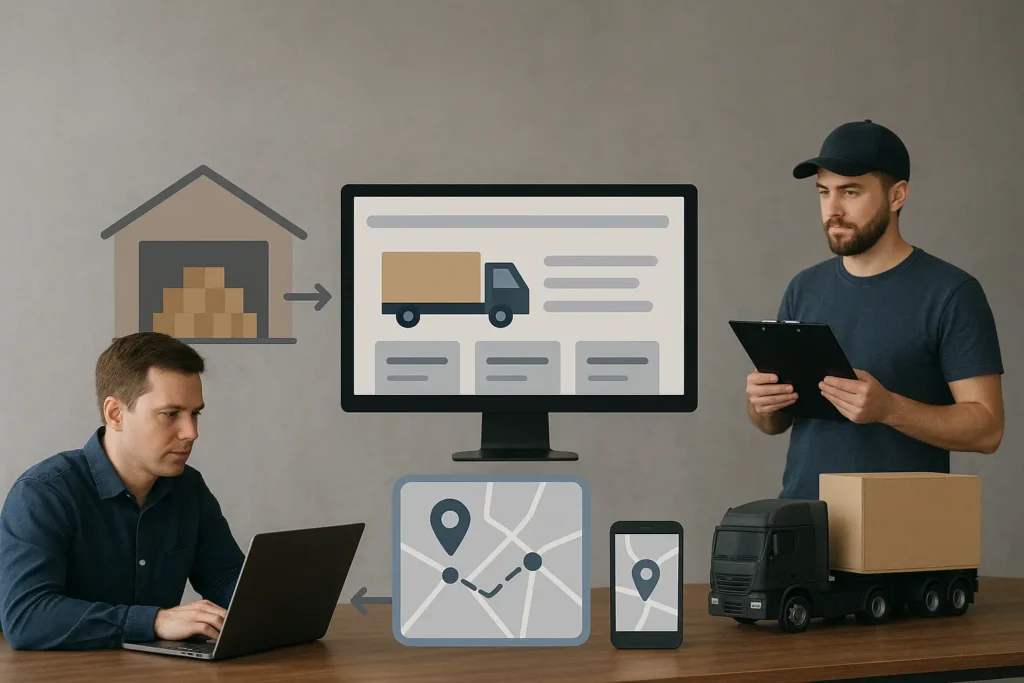The world of logistics is changing fast. Gone are the days when shippers had to spend hours calling transport companies or brokers to find trucks for their goods. Today, technology has made freight management easier, faster, and more transparent — thanks to digital freight marketplaces.
These platforms connect shippers and carriers online, helping both sides save time, reduce costs, and improve efficiency. But how do these digital freight marketplaces actually work? And why are they becoming so popular in global trade and logistics?
Let’s break it down in simple terms.
What Is a Digital Freight Marketplace?
A digital freight marketplace is an online platform that connects people who need to move goods (shippers) with those who can transport them (carriers, such as truck owners, logistics providers, or transport companies).
Think of it like an “Uber for freight.” Just as you can book a ride with a driver using an app, a shipper can use a digital freight platform to find a truck or container space for their cargo.
Everything — from booking and pricing to tracking and payments — can be done digitally.
Example:
Imagine a company in New York wants to send 50 tons of goods to London. Instead of calling 10 different trucking companies, the company can log into a digital freight platform, enter the shipment details, and instantly see quotes, available trucks, and delivery times.
Within minutes, they can select the best option and confirm the booking online.
How Do Digital Freight Marketplaces Work?
To understand how these platforms function, let’s go through the step-by-step process of how freight moves through a digital marketplace.
1. Shippers Post Their Load
The process starts with the shipper — a company or person who needs to move goods. They enter key shipment details on the platform such as:
Type of goods
Pickup and delivery locations
Weight and size of the cargo
Preferred delivery date
Any special requirements (like temperature control or packaging)
Once submitted, this information becomes visible to carriers registered on the platform.
2. Carriers See and Bid for Shipments
Carriers — trucking companies or independent transporters — browse through available shipments that match their routes or capacity. They can either:
Place a bid (if it’s an auction-style platform), or
Accept a listed rate (if the platform shows fixed prices)
This creates a transparent marketplace where multiple carriers compete, ensuring that shippers get the best price and service quality.
3. Matching and Booking
When the shipper finds a suitable carrier, the platform matches both parties and confirms the booking.
Depending on the platform, the match may be:
Manual — where the shipper selects from offers, or
Automated — where the system uses smart algorithms to find the best match instantly.
Advanced marketplaces use AI (Artificial Intelligence) and machine learning to match loads with the most efficient carrier, based on factors like:
Location
Vehicle type
Driver performance
Past delivery history
Route optimization
4. Real-Time Tracking
Once the cargo is on its way, both the shipper and the carrier can track it in real time using GPS-enabled systems.
This transparency helps everyone stay informed about:
Current shipment location
Estimated delivery time
Delays (if any)
Route progress
Tracking is one of the most valuable features because it builds trust and visibility — two things that traditional freight systems often lacked.
5. Digital Documentation and Payments
Digital freight marketplaces make all paperwork and payments easier. Things like:
Bills of lading
Invoices
Delivery receipts
…are stored and shared electronically.
Payments can also be made directly through the platform, reducing delays and errors. Some platforms even hold funds in escrow until the delivery is confirmed, ensuring fairness for both sides.
6. Reviews and Ratings
After the shipment is completed, both the shipper and carrier can rate each other.
This review system helps:
Build a community of trustworthy partners
Improve service quality
Encourage professionalism
Over time, carriers with good ratings attract more business, while shippers gain credibility with transport providers.
Key Features of Digital Freight Marketplaces
Let’s look at the main features that make these platforms stand out:
Feature Benefit
Instant quoting Shippers get prices within seconds
Route optimization Reduces delivery time and fuel cost
Real-time tracking Ensures transparency and accountability
Digital payments Faster, more secure transactions
Analytics dashboard Insights on costs, routes, and carrier performance
Multi-modal integration Supports road, sea, air, and rail freight
24/7 accessibility Users can book anytime, anywhere
Benefits of Digital Freight Marketplaces
These platforms are changing logistics for the better — not only for shippers and carriers but also for the overall supply chain.
Here are the main benefits:
1. Faster Bookings
What once took hours or days can now be done in minutes. No more long calls, waiting for quotes, or chasing paperwork.
2. Cost Savings
By allowing multiple carriers to compete for a shipment, digital marketplaces help shippers find the best price without sacrificing quality.
Carriers also save money by reducing empty miles — when trucks return empty after delivery — through smart load matching.
3. Improved Visibility
Real-time tracking keeps both sides informed about where the goods are at any given moment. This visibility reduces uncertainty, theft risk, and delays.
4. Better Use of Technology
Digital platforms use AI, GPS, IoT, and data analytics to improve logistics performance. This means smarter routes, reduced fuel costs, and higher efficiency.
5. Environmental Benefits
Optimized routes and reduced empty trips lead to lower fuel consumption, which helps cut down carbon emissions. This makes digital freight platforms not only efficient but also eco-friendly.
6. Data Insights
With every shipment, these platforms collect valuable data on:
Transport times
Carrier reliability
Pricing trends
Route efficiency
Businesses can use this data to plan better, forecast demand, and manage their logistics strategy more effectively.
Challenges of Digital Freight Marketplaces
While these platforms offer many advantages, they also face a few challenges:
1. Trust and Adoption
Some traditional logistics companies still hesitate to rely on digital systems, fearing fraud or lack of control.
2. Regulatory Issues
In some countries, logistics regulations are not yet designed to handle online freight marketplaces.
3. Technical Barriers
Small transport operators may lack smartphones, internet access, or digital payment systems.
4. Competition
With many startups and platforms entering the market, competition is tough. Success depends on user experience, network size, and technology.
Examples of Global Digital Freight Marketplaces
Here are a few well-known examples shaping the global logistics industry:
Convoy (USA) – Focuses on full truckload shipments with real-time matching.
Uber Freight (Global) – Offers instant freight booking and transparent pricing.
Freightos (Global) – Specializes in international freight forwarding and customs.
Flexport (Global) – Combines digital logistics with supply chain management.
Shipwell (USA) – Provides TMS (Transportation Management System) tools for businesses.
Each platform uses technology in its own way, but all share one common goal: to make freight transport simpler and more efficient.
The Future of Digital Freight Marketplaces
The digital freight market is growing rapidly. Experts predict that within the next decade, most freight transactions will be done online.
Here’s what we can expect in the future:
1. AI and Machine Learning Integration
These technologies will make matching faster and smarter, predicting demand and reducing delivery times.
2. Blockchain for Transparency
Blockchain will help verify transactions and shipment data securely, reducing fraud and disputes.
3. Sustainability Focus
More platforms will use carbon-tracking features to promote green logistics.
4. Global Expansion
As cross-border trade grows, more digital freight platforms will connect regional markets worldwide.
Why Businesses Are Moving Toward Digital Freight Marketplaces?
Businesses today want faster, transparent, and reliable logistics solutions. Digital freight marketplaces offer all that — plus data-driven insights and automation.
Whether it’s small businesses shipping within cities or large exporters moving containers across continents, digital platforms help them save time, money, and effort.
They turn complex logistics into simple, smart, and scalable operations.
Conclusion
The logistics industry is becoming more digital every day. Digital freight marketplaces are leading this transformation by connecting shippers and carriers through technology that simplifies freight movement, reduces costs, and increases visibility.
They are not just platforms — they are the future of logistics.
If your business is still relying on old-style freight management, now is the time to step into the digital age and experience the benefits of smart freight solutions.
Move Smarter with ISLO Logistics!
Join the new era of digital freight management with ISLO Logistics — where technology meets reliability.
From instant booking to real-time tracking, we simplify every step of your logistics journey.
Visit ISLO Logistics today to make your shipping faster, smarter, and more transparent!
FAQ’s About Digital Freight Marketplaces
Q1: What is a digital freight marketplace?
A digital freight marketplace is an online platform that connects shippers with carriers for booking and managing freight transport digitally.
Q2: How do digital freight marketplaces help shippers?
They make freight booking faster, cheaper, and more transparent with real-time tracking and automated pricing.
Q3: Do carriers benefit from digital freight platforms?
Yes. Carriers can find more loads, reduce empty miles, and get paid faster through digital systems.
Q4: Are digital freight marketplaces safe?
Yes. Reputed platforms use secure payment systems, verified partners, and data encryption for safety.
Q5: Can small businesses use digital freight marketplaces?
Absolutely! These platforms are built for businesses of all sizes and help small shippers compete efficiently.

